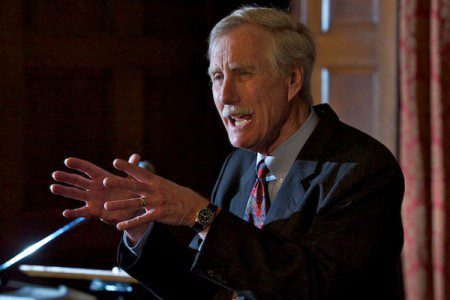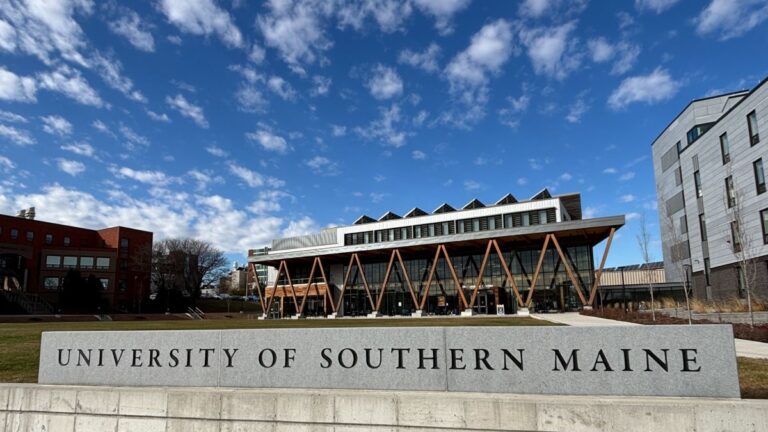When New York City mayor Michael Bloomberg announced last week that he’d be founding a Super PAC and spending some of his money in Maine in support of Angus King, the Independent candidate for U.S. Senate was as startled as anyone.
“I can tell you without any equivocation that I had no idea he was going to do this Super PAC thing,” King said. “Mayor Bloomberg’s made this decision without any request from me.”
King has met Bloomberg just three times: once at a centrist summit in Oklahoma in 2008, once last week for a fundraiser at the Mayor’s private residence, and once during a 45-minute meeting on a visit this summer to New York City.
“We talked about schools, we talked about centrist politics…. It wasn’t in great depth, but it was substantive,” King said in an interview Friday. “I think, frankly, he likes me. I think he likes me because I’m a centrist, pragmatic problem solver. I’m not a partisan, and that’s it.”
Bloomberg’s interest in the Maine senate race is not new — earlier this month, he put $500,000 into a different Super PAC that ran ads on King’s behalf.
But for this journalist — a Maine native who once took a college course taught by King (and received a B+) — the mayor’s announcement this week cried out for inquiry. Just why, exactly, was Bloomberg throwing his weight behind Maine’s mustachioed maverick? And was there anything to glean from the similarities between the mayor and his favored candidate in a state with roughly half the population of Brooklyn?
In one sense, the answer is obvious: with control of the U.S. Senate up for grabs, King, an Independent who leads in the polls, could be poised to assume a position at the nexus of power between Democrats and Republicans.
“He could be arguably the most powerful senator,” Bloomberg said Friday on his weekly radio show. “The country is so divided, roughly equally, that the Senate is going to be roughly equal, and one vote can make all the difference in the world.”
But the potential for King to become a power broker, I suspected, wasn’t the only dynamic involved. As a successful entrepreneur who rose to an executive-branch public position, and who governed as an Independent, the former Maine governor is also a politician cast in a Bloomberg-ian mold.
“I think what you see in King, and what you saw in him as governor, was the kind of confidence, which some read as arrogance, that he can rise above those kinds of intra-party squabbles,” said John Baughman, an associate professor of politics at Bates College in the Central Maine city of Lewiston.
Both Bloomberg and King, Baughman added, project a sense that they “can find a third way that others haven’t been able to discover,” and that “somehow, these institutions, which are so embedded in American politics, are somehow not going to affect them.”
As governor, King was successful in passing initiatives that garnered support from liberals and conservatives alike, from a constitutional amendment shoring up funding of Maine’s pension system to a program intended to promote job growth by reducing property taxes on local businesses.
King acknowledged that he and Bloomberg do have comparable backgrounds, even if the Maine candidate’s personal fortune is on a decidedly Maine scale.
“I think there are similarities, although he made a thousand times the money I did,” King said.
The other parallel between the two is on the issues. In announcing his Super PAC, Bloomberg said he would direct his money towards candidates who shared his views on school reform, same-sex marriage, and gun control.
King appears aligned with the Mayor on two out of the three. As governor, one of King’s signature initiatives was a program to put Apple laptops in the hands of every seventh- and eighth-grader in the state. And he said he plans to vote to legalize same-sex marriage in Maine’s referendum in November.
However, King’s views on gun control are more moderate than Bloomberg’s — which suggests the mayor may not have a Super PAC litmus test on the issue. King said he was never sent a survey or questionnaire by Bloomberg’s staff; he added that the two have not discussed their positions on gun control.
“I suspect if you put a side-by-side [comparison], you would find differences on that one,” King said. “But he never asked; the subject never came up. I don’t know to what extent somebody did research on me, or went to my website, or Googled me. But I can just tell you, from the three interactions I’ve had with him, they’re mostly about: ‘How do we make the system work?’”
At a forum on Super PACs on Thursday night, Bradley Tusk, a former Bloomberg campaign manager, offered some clues about the Mayor’s Super PAC spending strategy. (Tusk was speaking generally; he said in an email that he’s not formally involved with the effort.)
While candidates’ positions on issues are key, Tusk said, they’re not the only elements that Bloomberg considers. Other factors are a race’s impact on the balance of power, and, simply, how a candidate is likely to do on Election Day.
“It’s not just: ‘Do you believe in what we believe in?’ but, ‘Are you viable?’” Tusk said. “You need to look at: ‘How is the person on the issue? Does this race make sense? Is it winnable?’”
The conventional narrative about Super PACs, Tusk added, is that they’re “shadowy.” But, he argued, the committees are “generally pretty thoughtful, political people, who look at a lot of issues, and are pretty analytical about it.”
Still, the outside money presents a bit of a conundrum for King, who boasts on his website that “nobody will tell me how to vote – except the people of Maine.”
He said the Citizens United decision that relaxed rules on independent spending is “terrible,” and that he dislikes the current campaign finance system. King has also criticized the millions of SuperPAC dollars flowing into his race from conservative groups like the U.S. Chamber of Commerce, and the National Republican Senatorial Committee.
The difference, King said, is that the identities of the outside spenders on his behalf are known: two financiers, and Bloomberg, who King said is probably putting up money “because he thinks I’m the right guy.
“I don’t think he’s doing it because he expects anything in return.”
Editor’s Note: This story originally appeared in the New York World.







